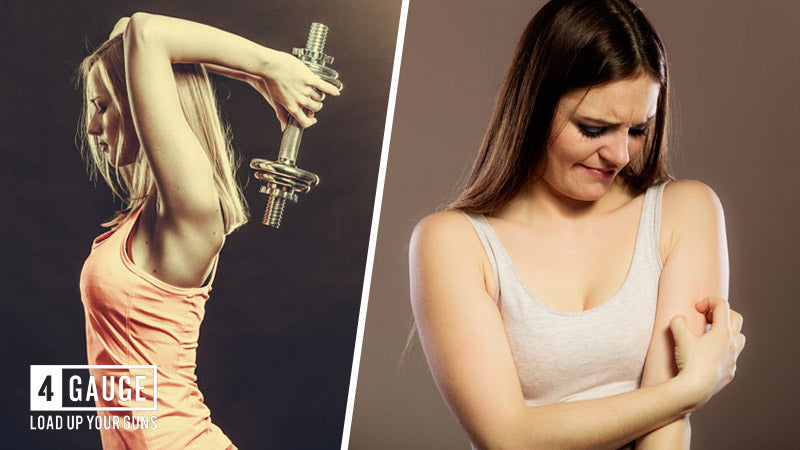Flash Sale!
Buy 3 Bottles of 4 Gauge ELITE,
Get 1 FREE + a FREE Shaker Bottle!
This store requires javascript to be enabled for some features to work correctly.

There’s no better feeling than when your pre workout kicks in. You feel that surge of energy. You’re invincible and the gym doesn’t stand a chance.
And in the battle between you and the barbell, there’s only going to be one winner.
But there’s one side effect that people can experience with certain types of pre workouts – a strange tingling sensation that makes you feel kind of itchy.
In this article we’ll tell you everything you need to know about the pre workout itch. Is it anything to worry about? And is it avoidable?
Find out here…
If you’re wanting to ramp up the productivity of your workouts, turn up the dial on your energy or crush some PRs in the weights room then a good quality pre workout is what you need.
As time goes on we’re finding more and more research studies showing the unique ingredients in pre workout supplements help to boost everything from blood flow and fat oxidation, to power, strength and endurance. They really are a cutting edge product.
If you’re not already using one then you’re missing out. It really is the next level up in your workouts.
If you’ve taken a pre workout recently you might have noticed one strange side effect that you weren’t expecting. A tingling or itchiness that’s hard to pinpoint.
You could experience itchiness anywhere on your body but it is commonly reported in the face, neck and back of hands.
For some, it’s a good sign that the pre workout is kicking in and it’s time to do some damage in the gym. For others it’s an uncomfortable side effect. Some people even choose to stop taking their supplement because the itchiness becomes too uncomfortable.
The proper name for this is paresthesia. And whilst the exact sensations can be different for different people, it’s typically is characterized by the following:

According to research, the itchy skin feeling of paresthesia occurs when you supplement a specific ingredient called beta-alanine.
It’s very much a dose dependent side effect too, with doses larger than 800 mg seeming to be a set point [1].
It doesn’t affect everyone and is pretty much non-existent at low doses, but once you hit the high doses your chances of itchy skin goes up massively.
But why is beta-alanine in your pre workout in the first place?
Beta-alanine is an amino-acid produced naturally in the liver. Over the last few years it has become a popular pre workout ingredient.
It is reported to enhance exercise performance by elevating levels of a peptide called carnosine – a compound said to buffer blood acidity therefore allowing you to train harder for longer.
So the only reason why beta-alanine has found it’s way into pre workout supplements is so as to elevate carnosine concentrations.
However, even though it might elevate carnosine levels, robust clinical studies show that beta-alanine supplementation does not enhance power output in either short-duration or long-duration repeated sprint exercise sessions [2, 3].
Nor does it seem to benefit strength or body composition either.
To date, there are some studies showing it may reduce feeling of exercise fatigue in older individuals, but other than that the research seems to be less favourable when it comes to its effects on overall exercise performance.
The benefits seem to be modest at best.

According to a position statement released by the Journal of the International Society of Sports Nutrition [4], “to date, there is no evidence to support that this tingling is harmful in any way”.
So it’s not so much that paresthesia will do you any harm – it’s more whether it distracts you from the task at hand when you’re trying to focus on your workout or not that’s the issue.
Currently, there’s no conclusive theory of why itchy skin can occur when taking a pre workout.
Several mechanisms exist, but the main hypothesis claims that beta-alanine activates a specific gene that switches on sensory neurons.
And because these receptors lie within the skin, their activation results in a tingling feeling.
In athletes taking high doses of over 40 mg per kilogram of body weight of beta-alanine, itchiness lasted for around 60 minutes [5]. Not one athlete complained of flushing, itchiness or prickly skin with doses lower than this.
It may even last for 90 minutes or so as well. That’s roughly long enough to last the whole gym workout.
There are a number of other pre workout ingredients that offer better benefits of beta-alanine… and without paresthesia. 
4 Gauge, contains caffeine, red beet and creatine which have all been seen to boost athletic exercise performance with no itchiness, numbness or feelings of pins and needles.
As an all-natural, revolutionary pre workout supplement, 4 Gauge has the power to: